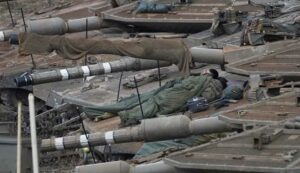US issues stern warning to Iran, says missile attack represents “significant escalation”
US: On Tuesday night, Iran launched a barrage of 181 ballistic missiles at Israel, triggering air raid sirens across the country and setting off nearly 10 million Israeli bomb bunkers. According to the Israel Defense Forces (IDF), the country’s state-of-the-art missile defense systems, including the Iron Dome and Arrow systems, intercepted a significant percentage of the missiles. Still, some bullets were able to penetrate the defense barrier, causing only minor damage and light injuries.

Israeli Prime Minister Benjamin Netanyahu condemned the attack, calling Iran a “huge mistake” and threatening to make Tehran “pay the price.”
The barrage of missiles marks Iran’s second direct attack on Israel this year; the first occurred in April and was swiftly repelled by Israeli and allied defense forces. According to Iranian sources, Tuesday’s attacks were revenge for recent Israeli military operations that resulted in the deaths of Hamas leader Ismail Haniyeh and senior Hezbollah commander Hassan Nasrallah.
In an exclusive interview with Media, Israeli Embassy spokesman Guy Nir said Tehran will receive a befitting reply. “If he (Ayatollah Ali Khamenei) plans to start a full-scale war with Israel, it will be a mistake for them (Iran),” Mr Nir told Media. “Israel’s response will not be a full-scale war, but something targeted and well-planned. In my opinion, neither side wants that.
According to Iran’s ambassador to India, Iraj Elahi, if regional tensions do not subside, Israel will be “attacked again” by Iran. “If the Hitler of our time (Netanyahu) stops his brutality and hostility, his country will not have to suffer the consequences,” Elahi told the media.
US issues warning of grave consequences
The missile attack signals a “significant escalation”, and US National Security Advisor Jake Sullivan warned Iran that its response to the attack would have “grave consequences”. At a White House press conference, Sullivan promised that the United States would support Israel’s right to retaliate.
US President Joe Biden shared this view, saying that military talks were underway to decide on appropriate action, while also reiterating his full support for Israel. Biden gave his pledge that the US military would support Israel’s defence efforts. will repel any missile attack by Iran. Responding to a question about the extent of US involvement, Biden said negotiations for a coordinated response were “active” and “ongoing.”
The attack and its consequences
The missile attack targeting three Israeli military sites close to Tel Aviv was attributed to Iran’s Islamic Revolutionary Guard Corps (IRGC). Iranian Foreign Minister Saeed Abbas Araghchi said the attack was over unless Israel moved forward. The IRGC threatened that any Israeli retaliatory strike would be met with “crushing strikes.”
Despite the fact that most of the missiles were intercepted, there were sporadic reports of casualties and damage. According to media, a Palestinian civilian was killed by missile debris in the West Bank city of Jericho, while two people were slightly injured by shrapnel in Tel Aviv. Within an hour, the Israeli military announced that the immediate threat had passed and residents could exit bomb shelters.
Consequences for the region and the world
The missile attack by Tehran coincides with growing concerns of a wider regional confrontation. The Israeli military launched ground attacks targeting Hezbollah positions in southern Lebanon. According to Lebanese officials, at least 55 people have been killed as a result of the recent Israeli bombing, bringing the total number of dead to a high level since the conflict intensified in early October.
Hundreds of thousands of people have been displaced across the region and more than 1,800 people have been killed since the war began, according to the Lebanese Ministry of Health. The international world is concerned about the possibility of future escalation of tensions between Israel and militants in Gaza and Lebanon who are backed by Iran.
International reactions: UN Secretary-General Antonio Guterres condemned the attack, demanding an immediate ceasefire and issuing a warning over the growing conflict in the Middle East. “This must end. A ceasefire is desperately needed,” Guterres said in a statement.
Israel, Jordan and Iraq blocked its airspace as hostilities escalated and flights were halted at Israel’s Ben Gurion Airport, Tehran International Airport and other regional airports. Jordan and Iraq, two neighbouring countries, are bracing for more fallout as Iraqi militias backed by Iran have vowed to attack US sites in the region if Washington joins the war.





